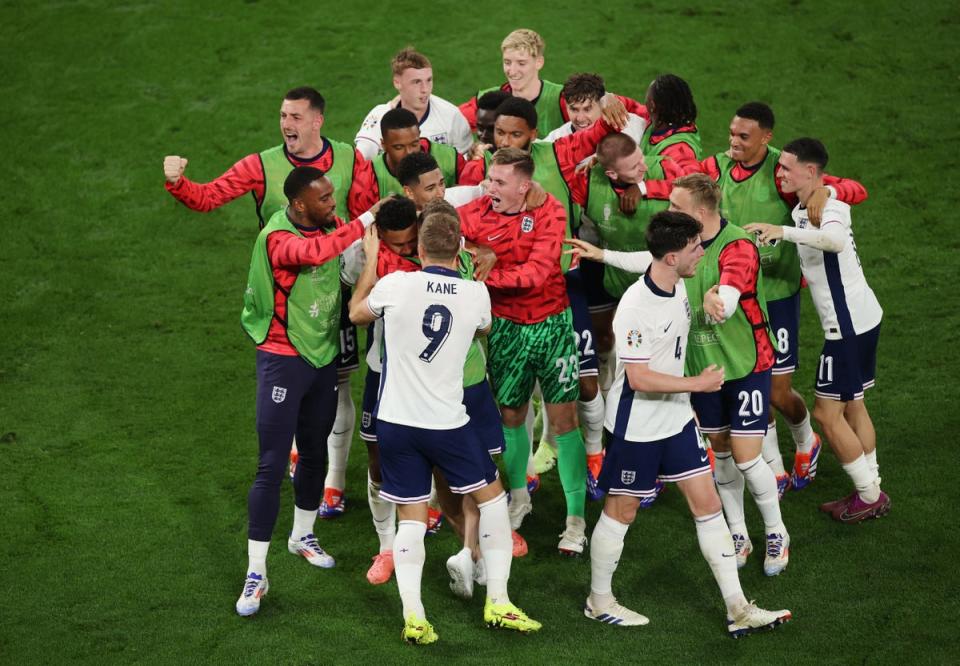How Gareth Southgate changed England fortunes and rebranded patriotism
Southgate, you’re the one. The one manager in England’s century and a half of playing international football to take them to two finals. The only one to reach a final on foreign soil. The one who, if Spain are beaten in Berlin on Sunday, will have a claim to dislodge Sir Alf Ramsey from the top of the list of England managers.
Win Euro 2024 and it will complete an eight-year journey for Gareth Southgate; one of largely smooth, and sometimes unexpected, progress over the first five years, but a rockier ride during the last three, when there have been questions if the manager who took England forwards has then taken them back again.
Slovakia could have been his Iceland, almost bringing England back to 2016. Southgate’s reign has felt in endgame every game; because of some of the hostility from outside, because of his restlessness, because of the pressure he has put on himself. He has remained the FA’s ideal manager, but with the possibility he could sack himself.
The manager who has been criticised for his apparent inability to change games when his sides lost leads in the past has instead seen them mount a series of comebacks: trailing to Slovakia, Switzerland and Netherlands, overcoming each after extra time, via penalties and with a 90th-minute winner respectively.
Southgate has triumphed with his substitutions, but also with his non-substitutions, such as keeping the eventual scorers Harry Kane and Jude Bellingham on against Slovakia. He has been ruthless at times, loyal at others. He has shifted system: mid-match at times and then with a switch to a back three from the quarter-finals.

All of which is an indication that Southgate has made a greater impact than is often acknowledged. He is underestimated; by the rest of Europe, perhaps, amid some scathing verdicts, but also by many in the England support. The image has seemed cemented that a great group of players are being held back by a mediocre manager.
Southgate can often be a voice of reason; he has been while speaking of English “entitlement”, in offering reminders that other countries have fine footballers, too.
He is tougher than the image of the Marks & Spencer-wearing eminently nice uncle would suggest, sensitive enough to be hurt by the brickbats. “We all want to be loved, right?” he said after the semi-final victory in Dortmund. “So when you are doing something for your country and you are a proud Englishman and you don’t feel that back and all you read is criticism, it is hard.”
Southgate had cups of beer thrown at him after the draw with Slovenia. His name has been booed before games. In the nadir of his reign, 2022’s 4-0 thrashing by Hungary, he was ambushed with chants accusing him of not knowing what he was doing. It explains why he considered making the Qatar World Cup his last tournament, why he said two years ago he would not “outstay my welcome”. If Euro 2024 has lent itself to different conclusions, now it is apparent he has not.

On Wednesday, he described himself as a “kindred spirit” of the fans; it is only partially true in that he reflects some but not others. He has tried to rebrand patriotism, with thoughtfulness, inclusivity and an emotional intelligence that contributes to his understanding of his players.
It is often, and accurately, said that Southgate is not instinctively a managerial genius. He is not; but he is a careful planner who has learnt. If attention to detail in preparation accounted for some of his successes, whether England’s improved record in penalty shootouts or the “love train” (the set-piece routines of the 2018 World Cup), Euro 2024 has brought better in-game changes. Southgate is evolving.
He is called a lucky manager. England landed in the much weaker half of the draw. Over their first five games in Germany, they prevailed without excelling. Yet there were conditions where an exit could have been attributed to bad luck: the injuries to Luke Shaw and Harry Maguire that stripped him of half of his first-choice defence, those to Bukayo Saka, Kieran Trippier and Kane that meant none began the tournament in top shape, the way the tactically important pair of Jordan Henderson and Kalvin Phillips became unselectable, the troubled seasons of Marcus Rashford, Mason Mount and Jack Grealish that meant players with a significance in the past were all omitted.

The context, too, was that England have been burdened by their own ambition. “We came here to make history,” Southgate said after beating the Dutch. Such talk is not new; his England have been open in their aims, even when scarcely playing like potential champions. His age of innocence is over, the early optimism replaced by a more toxic climate.
And yet here England are, back in another final, the Southgate revolution again one game from completing a transformation in the fortunes of the national team. It would be a singular achievement that perhaps only one man could have accomplished.

 Yahoo Sports
Yahoo Sports 
